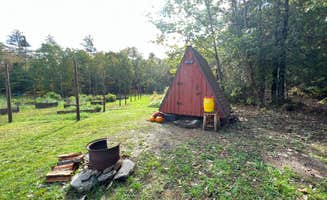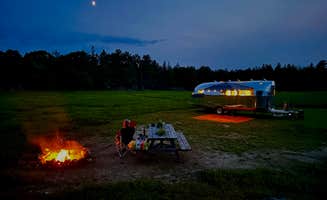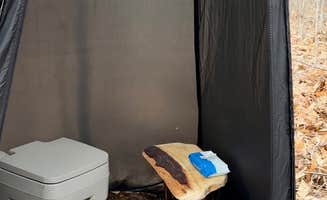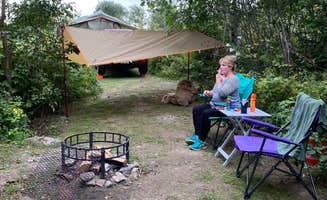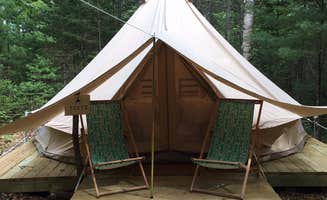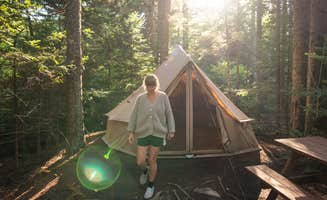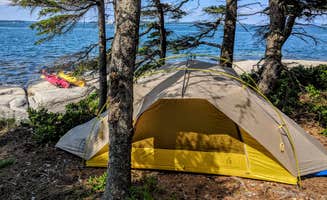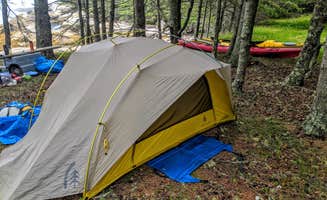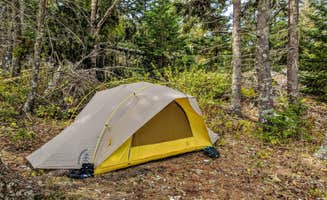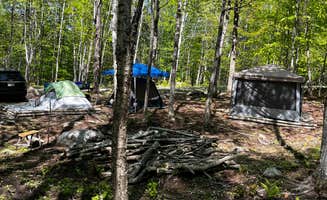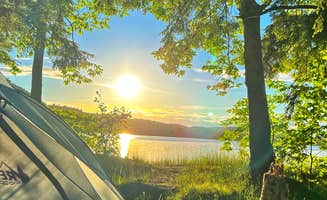Tent camping in Jackson, Maine offers access to secluded woodland sites with varying amenities across several small, family-operated campgrounds. The area experiences warm summer days with temperatures averaging 75-80°F and cooler nights around 55-60°F. Mosquitoes are prevalent from June through August, particularly near water features and during evening hours.
What to do
Kayaking at Tiny Cabins of Maine: Paddle on the small pond directly from the property's convenient dock. A camper noted that "kayaking in the pond was a highlight, thanks to the convenient dock" and that despite some limitations on the trail network, "the directional signs helped."
Wild blueberry picking: Available seasonally at Maine Wild Blueberry Bliss during late July and early August. According to a visitor, "We swam in the water everyday, and picked/ate the blueberries!" The property features rolling fields of wild blueberries that campers can harvest during their stay.
Farm experiences: Visit working farms like Continuous Harmony Farm that offer camping near agricultural operations. One visitor mentioned, "The space is gorgeous, right next to a pond" and noted they could "watch the sheep" while camping, creating a unique farm-based camping experience.
What campers like
Privacy between sites: Many campgrounds offer good separation between camping areas. At Tiny Cabins of Maine, a camper praised the "wonderful small family retreat" atmosphere where each site has "its own firepit and porch" creating individual spaces.
Water access: Several campgrounds feature ponds or water features. One guest at The Hawnets Nest appreciated that "accommodations include a cool A-Frame or bring-your-own Tent" with water nearby, making it "the perfect stop for adventure."
Rustic amenities: Basic yet thoughtful facilities enhance the camping experience. A camper at Maine Wild Blueberry Bliss mentioned, "The owner had a picnic table set up with flower boxes in it, and there was a nice fire ring" showing attention to simple comforts that improve the outdoor experience.
What you should know
Unmarked sites: Several campgrounds have minimal signage or site markings. At Continuous Harmony Farm, a camper observed "The sites are not marked at all and there did not seem to be a way to check in" which created some initial confusion about where to set up.
Limited facilities: Most tent camping sites provide basic amenities only. The Forest Poshtel offers fire rings and toilet facilities but does not allow pets, limiting options for those traveling with animals.
Clothing optional options: For those seeking alternative camping experiences, Rough and Raw provides a clothing-optional environment. A camper described it as "A true hidden gem. We had no idea there was a clothing optional site near Acadia and stumbled across this with hipcamp. A safe and lovely primitive site."
Tips for camping with families
Bring water toys: Most pond-side campsites don't provide equipment. A family staying at Tiny Cabins of Maine mentioned, "We enjoyed the pub's games and even tried our hand at axe throwing" suggesting families should bring their own entertainment options.
Consider noise levels: Road proximity varies between campgrounds. One family noted at Tops'l Farm that "Each site has its own firepit and porch" but mentioned they "provide various bug spray's that you can use" due to mosquito activity, suggesting families prepare accordingly.
Book early for holiday weekends: Many small campgrounds fill quickly during peak times. Maine Wild Blueberry Bliss campers observed "The land was quiet and peaceful - it is acres of blueberry fields, which create a special sense of being in nature" making it popular during summer months.
Tips from RVers
Limited hookup options: Most tent campgrounds near Jackson have minimal RV facilities. At Maine Wild Blueberry Bliss, an RVer mentioned "the land is open and flat, and there was plenty of room for our rv" but noted "It is dry camping, with no hookups, and generators are not allowed."
Smaller RVs recommended: Narrow access roads can be challenging for larger vehicles. Campers generally suggest units under 25 feet for most area campgrounds due to limited turning radius and smaller sites.


